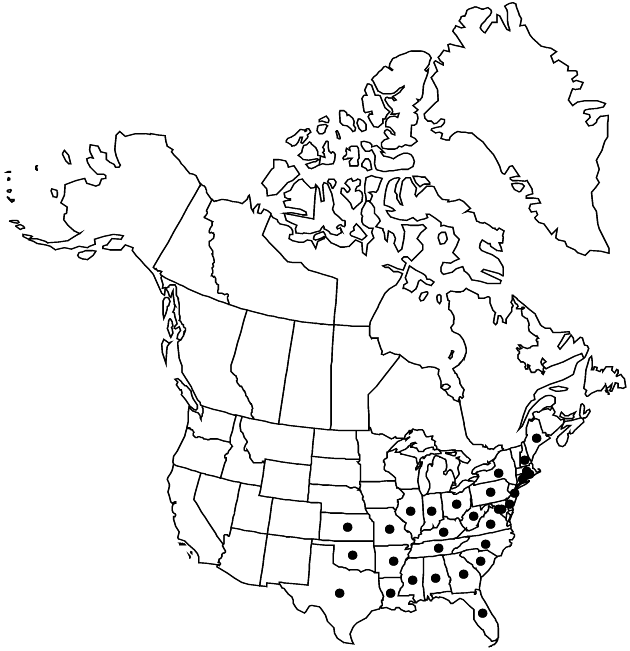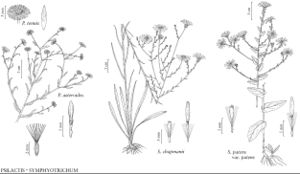familyAsteraceae
genusSymphyotrichum
subgenusSymphyotrichum subg. Virgulus
speciesSymphyotrichum patens
Symphyotrichum patens var. patens
IllustratedEndemic
Synonyms: Aster amplexicaulis Michaux Aster virgatus Elliott
Treatment appears in FNA Volume 20. Treatment on page 489.
Revision as of 20:01, 29 July 2020 by imported>Volume Importer
Plants robust. Involucres campanulate, 5.5–7.5 mm. Phyllaries in 4–5 series, squarrose, acute to acuminate, sparsely strigillose, densely stipitate-glandular; mid 1–1.2 mm wide. 2n = 10, 20.
Phenology: Flowering (Aug–)Sept–Nov(–Dec).
Habitat: Sandy, loamy, shaley, or clayey soils, dry woods, open oak and pine woods, fields, roadsides, disturbed habitats
Elevation: 0–100+ m
Distribution

Ala., Ark., Conn., Del., D.C., Fla., Ga., Ill., Ind., Kans., Ky., La., Maine, Md., Mass., Miss., Mo., N.H., N.J., N.Y., N.C., Ohio, Okla., Pa., R.I., S.C., Tenn., Tex., Va., W.Va.
Discussion
Variety patens is found in the southern Central Lowland, the Appalachian Mountains, the Piedmont, and the Coastal Plains. Aster patens forma rosea Svenson is a color morph that is not recognized here.
Selected References
None.
Lower Taxa
None.
"thick" is not a number.
... more about "Symphyotrichum patens var. patens"
introrse +
connate +
foliaceous +
purplish red +
distinct +
herbaceous +
acuminate;obtuse;acute +
scarious +
hirsute +
papillate +
paniculiform +
continuous +
subpetiolate +
deciduous +
withering +
linear-oblanceolate;obovate;oblanceolate +
cordate-clasping to auriculate-amplexicaul +
cordate-clasping +
cuneate +
indurate +
flowering +
ovate;spatulate;usually ovate;lanceolate +
reduced +
ribbed +
divaricate +
stigmatic +
persistent +
absent +
cormoid +
tangled +
woody +
thick +
sessile +
at maturity , more or less ampliate , tubes usually shorter +
absent +
7-10-nerved +
dimorphic +
strigillose +
2mm;3.5mm +
ampliate +
staminate +
sessile +
straight +
eglandular +
scabrous +
rugulose +
distinct +
proximal +
1;5 +
bisexual +
dispersed +
Sandy, loamy, shaley, or clayey soils, dry woods, open oak and pine woods, fields, roadsides, disturbed habitats +
singly +
indeterminate +
Present +
surrounding +
campanulate +
10mm;18mm +
1mm;3mm +
alternate +
stiff +
scabrous +
decurrent +
erect +
triangular +
? (?) +
hyaline +
scabrous +
scarious +
foliaceous +
2-carpellate +
inferior +
attached +
anatropous +
barbellate +
persistent +
equal +
ascending +
slender +
tough +
thick +
absent +
connate +
foliaceous +
persistent +
distinct +
falling +
squarrose +
unequal +
Phytologia +
1995 +
absent +
sterile +
epaleate +
pitted +
flat;slightly convex +
fibrous +
exalbuminous +
modifed +
pistillate +
4;5 +
fertile +
alternate +
brittle +
vinelike +
lanceolate +
2-branched +
glabrous +
Symphyotrichum patens var. patens +
Symphyotrichum patens +
variety +
flowering +
shorter +
maturity +
perennial +
cespitose +
stipitate-glandular +
robust +
green +
diamond--shaped +
